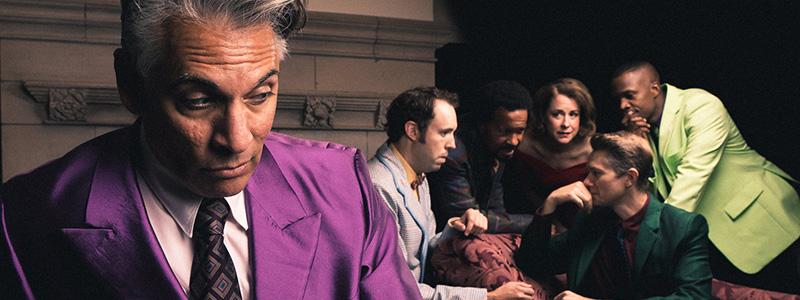Warning: The following review contains spoilers.
The winter may be mild in Chicago this year, but at Monkswell Manor, a quirky guesthouse in the outskirts of London, the snow won’t stop falling. There, Mr. and Mrs. Ralston (owners of Monkswell Manor), their four guests, and Major Metcalf become entangled in a perplexing murder mystery, all within the four walls of the manor.
This is Court Theatre’s The Mousetrap, a comedic murder mystery play by Agatha Christie. The show has been a favorite among West End viewers ever since its premiere in 1952, but Court Theatre shows that there is still more to be explored in this classic comedy. While the actors brought outstanding wit and humor to the stage, the true showstoppers were Sean Graney's direction and Arnel Sancianco's scenic design.
The show begins with uptight Mrs. Ralston, nervously waiting for her guests to arrive. The first to step through the doors, covered in snow, is Christopher Wren, a man with a thick head of hair that resists any sense of order, dressed head-to-toe in bright orange and mix-matched patterns. Mr. Ralston is immediately suspicious of Wren’s weightless suitcase and his performative persona, but politely escorts him to his room.
As we slowly realize, every guest who walks into the manor is peculiar––to say the least. Mrs. Boyle is an overly critical old lady displeased with everything she sees, Miss Casewell a haughty, masculine young woman, and Mr. Paravicini an older foreign man in heavy makeup, dressed in purple suit shorts. The conversations and arguments between these guests are hilarious, and the performers exhibit exceptional talent as they manage to make these eccentric characters outrageous, yet also realistic and human.
In particular, David Cerda brought roars of laughter from the audience with his endearing portrayal of Mr. Paravicini. Despite his comparatively smaller role in the greater arch of the plot, Cerda’s unparalleled comedic timing kept the show on its feet, using his subtle reactions to enliven other characters’ longer monologues. Throughout the play, laughter never seemed to leave Cerda’s side, and a trail of giggles followed him even as he made his final exit from the manor.
Another exceptional performance was given by Erik Hellman, who played Detective Sergeant Trotter, assigned to investigate the murder. His complete shift in character following the reveal of his true identity brought a wave of sadness and gravity to the light-hearted show. It is precisely this mix of seriousness and comedy that makes The Mousetrap so enticing, and Hellman was the actor most capable of embodying the play’s unpredictable quality.
However, none of these characters would have come to life had they not been complemented by Sean Graney’s witty directorial choices. Throughout the show, the candy bowl sitting in the manor’s lobby acted as a motif for mystery and suspense. The guests would constantly eat one whenever they disliked something or felt nervous or awkward. But the true climax of suspense came during the interrogation scene, when Sergeant Trotter sat everyone in the manor down in a straight line, asking them to reveal anything about themselves that may be relevant to the murder case. The entire time, the characters fidgeted and played with their crumpled candy wrappers, creating a symphony of guilty crackling behind the Sergeant’s monologue.
Graney’s collaboration with Arnel Sancianco’s scenic design was ingenious. Unlike the staging of the show at West End, Sancianco reinterpreted the visuals by using a thrust stage. A corner of the manor’s floor jutted out towards the audience, creating a private corner where the characters could reveal their vulnerability. This corner played an essential role in the show, as it continuously emphasized the overwhelming sense of secrecy and claustrophobia in the manor. Sitting near the corner of this protruding stage, I was uncomfortably close to the actors at times, but it was this tension that complemented the storyline so effectively. Overall, the combination of Sancianco’s visual innovation and Graney’s clever direction made Court Theatre’s production of The Mousetrap unique from the versions preceding it.
If you are able to attend one of the few remaining performances, it is well worth braving the cold to catch Court Theater's production of Agatha Christie’s masterpiece.









